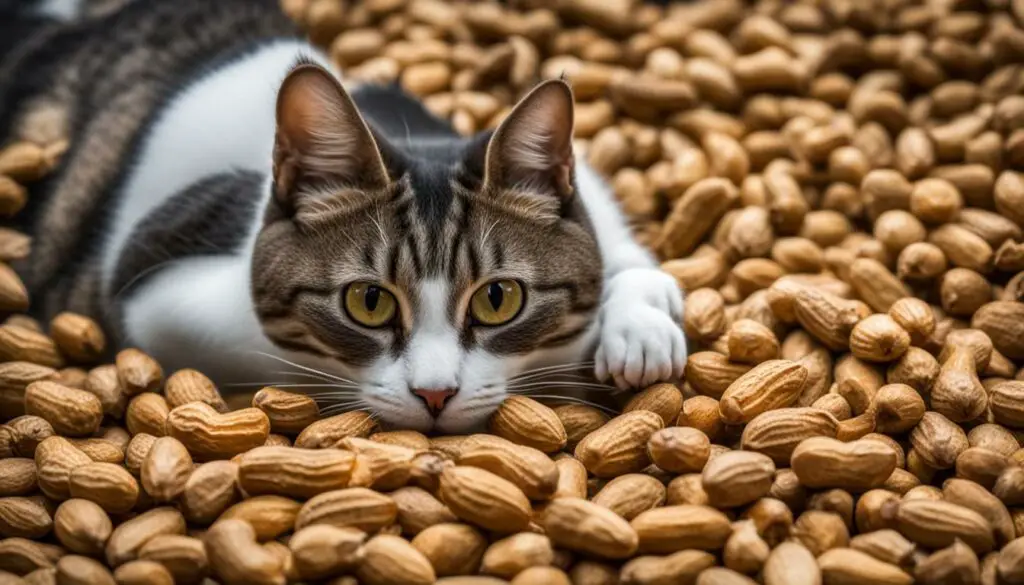Greetings feline lovers! Today, I want to delve into the fascinating question of whether cats can eat peanuts. As responsible cat owners, it’s essential to understand their dietary needs and make informed choices about their nutrition. So, let’s dive into the topic!
Now, when it comes to peanuts, it’s important to note that while they are not toxic to cats, they are not recommended for their diet. Peanuts contain high levels of fat and can be challenging for our feline friends to digest, potentially leading to digestive issues. Cats require animal-based protein as a primary component of their diet, and peanuts simply don’t provide the necessary nutrients for their overall health.
In addition to being nutritionally inadequate, peanuts can also pose risks of allergies and choking hazards for cats. These concerns further reinforce why it’s best to avoid introducing peanuts into their diet.
Key Takeaways:
- While peanuts are not toxic to cats, they are not recommended for their diet.
- Peanuts are high in fat and can be difficult for cats to digest, potentially causing digestive issues.
- Cats require animal-based protein in their diet, and peanuts do not provide the necessary nutrients.
- Peanuts can pose risks of allergies and choking hazards for cats.
- It is best to avoid giving peanuts to cats and opt for other healthy treat options.
Are Peanuts Good for Cats?
When it comes to the question of whether peanuts are good for cats, the answer is not as straightforward as it may seem. While peanuts do provide some protein, vitamins, and minerals that can be beneficial for cats’ overall health, they are not the most suitable source of nutrition for our feline friends. Cats are obligate carnivores, meaning they require a diet primarily consisting of animal-based protein.
While peanuts contain protein, it is important to note that they are not the ideal source of this essential nutrient for cats. Animal protein, such as that found in high-quality cat food, is more biologically appropriate and provides cats with the necessary amino acids for optimal health. Additionally, other treats specifically formulated for feline needs offer a wider range of nutrients, including vitamins and minerals, that support heart health, bone health, and overall wellbeing.
In summary, while peanuts do offer some nutritional benefits for cats, they are not the best choice when it comes to providing a balanced diet. Cats require a primarily animal-based protein diet, and other alternatives, such as high-quality cat treats, can offer a more suitable and comprehensive source of nutrients. It is important to prioritize your cat’s specific dietary needs and consult with a veterinarian for guidance on the best nutrition plan for your furry friend.
| Nutrient | Peanuts | Alternative Treats |
|---|---|---|
| Protein | Contains some protein | Provides animal-based protein |
| Vitamins | Contains some vitamins | Offers a wider range of vitamins |
| Minerals | Contains some minerals | Provides essential minerals |
| Heart Health | Somewhat beneficial | Specifically formulated for heart health |
| Bone Health | Offers minimal support | Designed to promote bone health |
Do Cats Like the Taste of Peanuts?
Cats have individual taste preferences, and while some cats may enjoy eating peanuts, most cats prefer fishy or meaty flavors. Peanuts may seem unappealing in comparison to other more potent flavors and smells that cats prefer.
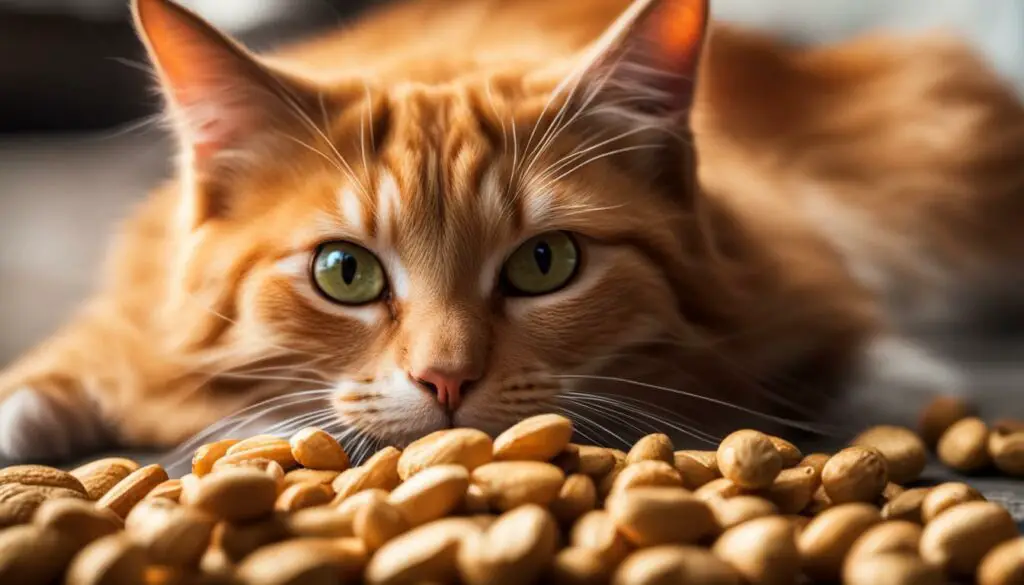
When it comes to taste preferences, cats are known for their attraction to foods that are rich in animal-based protein. This preference stems from their natural carnivorous instincts. While peanuts do contain a small amount of protein, they are primarily a plant-based food and do not offer the same level of appeal to cats as fish or meat.
Additionally, the high fat content of peanuts may contribute to their lack of popularity among cats. Cats‘ digestive systems are designed to efficiently process animal fats, and they may find it harder to digest the fats found in peanuts. This could lead to potential digestive issues and discomfort for our feline friends.
Providing Variety for Your Cat’s Palate
As responsible pet owners, it’s important to ensure that we offer our cats a varied and balanced diet that meets their nutritional needs. While some cats may show an interest in peanuts, it is essential to prioritize their health and choose alternative treats that align with their dietary requirements.
There are numerous commercially available treats specifically formulated for cats that offer a wide range of flavors and textures. Fish treats and meaty treats are popular options that are more likely to appeal to your cat’s taste buds. These treats not only provide a delicious snack but also help to ensure that your cat receives the essential animal-based protein they need for optimal health.
Understanding Your Cat’s Preferences
Observing your cat’s reactions and preferences when it comes to food can provide valuable insight into their taste preferences. By paying attention to their behavior and experimenting with different flavors, you can better understand what your cat enjoys and cater to their individual tastes.
While the occasional peanut may not pose any significant harm to your cat, it’s important to recognize that peanuts may not be their preferred choice. Offering a variety of flavors and textures that align with their natural instincts and dietary needs will not only keep them satisfied but also contribute to their overall well-being.
How Many Peanuts Can a Cat Eat?
When it comes to feeding your cat peanuts, moderation is key. Peanuts should be offered to cats in minimal amounts, and it’s important to start slow and observe your cat’s reaction. Plain, unsalted peanuts without shells are preferred, as added salt and seasoning can be harmful to cats. It’s also important to note that some cats may have allergies to peanuts, so it’s crucial to monitor for any allergic reactions or symptoms such as vomiting or diarrhea.
If your cat has never had peanuts before, it’s best to introduce them gradually. Start with a small piece, crushed or halved, and observe your cat’s response. If there are no negative reactions, you can gradually increase the amount, always keeping it within moderation. Remember, peanuts should never become a staple in your cat’s diet, as they do not provide the necessary nutrients for a feline’s health.
Table: Illustration of Peanut Intake Guidelines for Cats
| Weight of Cat | Amount of Peanuts |
|---|---|
| Under 5 lbs (2.3 kg) | No more than 1 crushed peanut every few weeks |
| 5 – 10 lbs (2.3 – 4.5 kg) | No more than 1 halved peanut every few weeks |
| 10 – 15 lbs (4.5 – 6.8 kg) | No more than 2 halved peanuts every few weeks |
| 15 lbs (6.8 kg) and above | No more than 3 halved peanuts every few weeks |
Remember, every cat is unique, and what works for one cat may not work for another. If you have any concerns about feeding peanuts to your cat, it’s always best to consult with your veterinarian for professional guidance.
How Often Can a Cat Eat Peanuts?
When it comes to feeding peanuts to cats, moderation is key. Peanuts should not be a regular part of a cat’s diet as they do not provide the necessary animal-based protein that cats need. Instead, the majority of a cat’s diet should consist of high-quality cat food that meets their nutritional needs. Treats, including peanuts, should be given sparingly and in small quantities.
Cats are obligate carnivores, and their bodies are designed to thrive on a diet that is primarily meat-based. Animal protein is essential for cats to maintain optimal health and to support their various bodily functions. While peanuts do contain protein, it is not in the form that cats can easily digest and utilize.
It is important to note that cats have different nutritional requirements than humans and other animals. While we may enjoy peanuts as a snack, it is not suitable for cats to consume them regularly. Instead, consider offering alternative treats that are specifically formulated for feline dietary needs, such as fish treats or meat treats. These options provide a more appropriate source of animal protein for your furry friend.
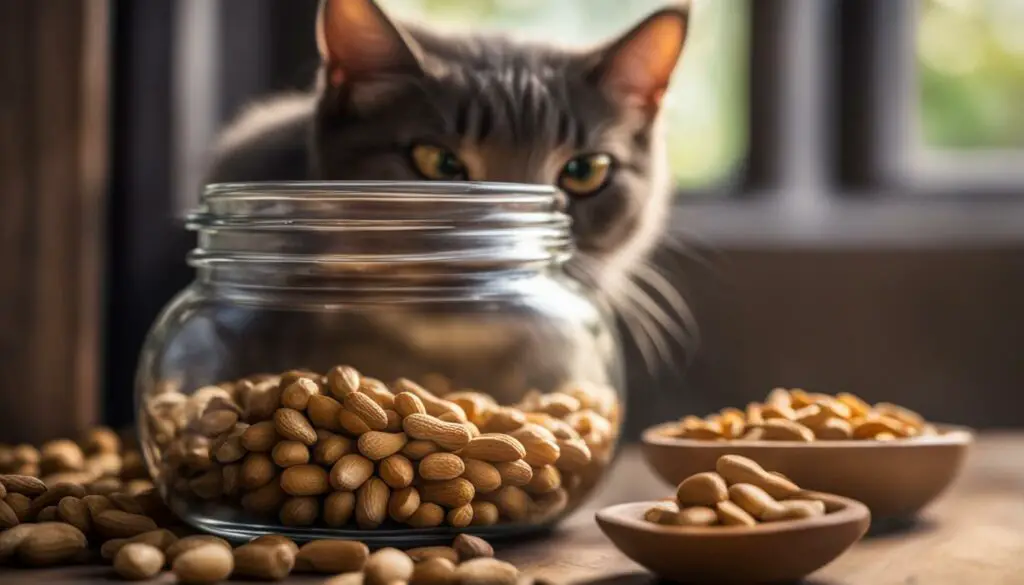
Are Peanuts Used in Commercial Cat Food?
When it comes to commercial cat food, peanuts are not commonly used as an ingredient. Cats generally prefer flavors that are more aligned with their carnivorous nature, such as fish or meat flavors. While peanut butter may be occasionally used in some dog treats, it is less commonly found in cat treats due to their flavor preferences.
One reason for this is that peanuts have a distinct flavor that may not be appealing to most cats. Cats tend to gravitate towards stronger, more potent flavors and smells, which is why fishy or meaty flavors are often preferred. Peanuts simply do not have the same appeal to their taste buds.
Moreover, there can be potential choking hazards associated with peanuts in commercial cat food. The size and shape of peanuts can pose risks, especially for cats with smaller mouths and throats. To ensure the safety of cats, pet food manufacturers choose alternative ingredients that are more suitable and less likely to cause choking incidents.

Table: Comparison of Peanut Butter and Commercial Cat Treats
| Peanut Butter | Commercial Cat Treats | |
|---|---|---|
| Flavor Preference | Peanut flavor | Fish or meat flavor |
| Potential Choking Hazard | Yes | No |
| Common Usage | Dog treats | Occasional or specialized cat treats |
Overall, while peanuts may be occasionally used in some commercial cat treats, they are not a common ingredient in cat food. Cats generally prefer flavors that are more aligned with their carnivorous nature, and there can be potential choking hazards associated with the use of peanuts. Pet food manufacturers prioritize the safety and taste preferences of cats, opting for alternative ingredients that are more appealing and suitable for feline consumption.
Risks of Peanuts for Cats
When it comes to cats, their carnivorous diet plays a crucial role in determining what is safe and beneficial for them to consume. While peanuts are not toxic to cats, there are several risks associated with feeding them to our feline friends.
One of the main concerns is the potential for weight gain. Cats are prone to obesity, and peanuts are high in fat content. Feeding peanuts to cats, especially those who are already overweight, can contribute to further weight gain and obesity-related health issues.
“Feeding peanuts to cats can lead to weight gain and obesity-related health issues.”
Another risk to be aware of is the sodium content in peanuts. Some peanuts, particularly salted ones, can have high levels of sodium. Cats with underlying heart or kidney issues are especially vulnerable to salt poisoning. It’s important to monitor the sodium content in any treats or food items, including peanuts, before giving them to your cat.
| Risks of Feeding Peanuts to Cats | Precautions |
|---|---|
| Weight gain and obesity | Limit peanut consumption, especially for overweight cats |
| High sodium content | Avoid salted peanuts and monitor sodium levels |
| Allergic reactions | Start with small amounts and watch for any adverse reactions |
Lastly, peanuts can also trigger allergic reactions in cats. Due to their high protein content, cats can develop allergies or sensitivities to peanuts. It’s important to introduce peanuts gradually and in small amounts, closely monitoring your cat for any signs of allergic reactions such as itching, rashes, or gastrointestinal issues.
While peanuts may seem like a harmless treat, it’s best to avoid feeding them to your cat. Cats have specific dietary requirements that are best met through a balanced, high-quality cat food. If you’re looking for alternative treats, there are plenty of feline-friendly options available that are specifically formulated to meet their nutritional needs.
Cats and Peanut Butter
When it comes to cats and peanut butter, there are a few important considerations to keep in mind. While peanut butter may be a favorite treat for humans, it is not recommended as a regular part of a cat’s diet. Here’s why:
- Peanut butter is high in calories, fat, and carbohydrates, which can contribute to weight gain and obesity in cats. Excessive weight can lead to various health issues, including diabetes and joint problems.
- The thick consistency of peanut butter can pose a choking hazard for cats, especially those with smaller mouths and throats. It is essential to ensure that cats have access to fresh water when consuming peanut butter to avoid any potential choking incidents.
- Cats have specific dietary needs, and their bodies are adapted to digest animal-based protein. While peanut butter does contain some protein, it is not in the form that cats require for optimal health.
While cats may be attracted to the taste and smell of peanut butter, it is best to offer alternative treats that are specifically formulated for feline dietary needs. There are plenty of healthy cat treats available that provide the necessary nutrients without the potential risks associated with peanut butter consumption.
“Peanut butter is not recommended for cats as a regular part of their diet. It is high in calories, fat, and carbohydrates, which can contribute to weight gain and digestive issues.”
If you want to give your cat a special treat every now and then, it’s important to do so in moderation. Small amounts of peanut butter can be given on rare occasions, but it is always advisable to consult with a veterinarian before introducing any new food into your cat’s diet. They can provide guidance on portion sizes and help you choose the best treats for your furry friend.
Table: Comparison of Peanut Butter and Feline-Friendly Treats
| Treat | Nutritional Value | Weight Gain Risk | Digestive Issues Risk | Choking Hazard |
|---|---|---|---|---|
| Peanut Butter | High in calories, fat, and carbohydrates; low in essential nutrients | High risk | High risk | High risk |
| Feline-Friendly Treats | Specifically formulated for feline dietary needs; contain essential nutrients | Low risk | Low risk | Low risk |
As the table above illustrates, feline-friendly treats are a much healthier option for cats compared to peanut butter. These treats are designed to meet the nutritional needs of cats and are less likely to contribute to weight gain, digestive issues, or choking hazards.
Remember, providing a balanced and appropriate diet is crucial for your cat’s overall health and well-being. While peanut butter may seem like a tasty treat, it is best to prioritize their specific dietary needs and offer alternative treats that are safe and beneficial for cats.
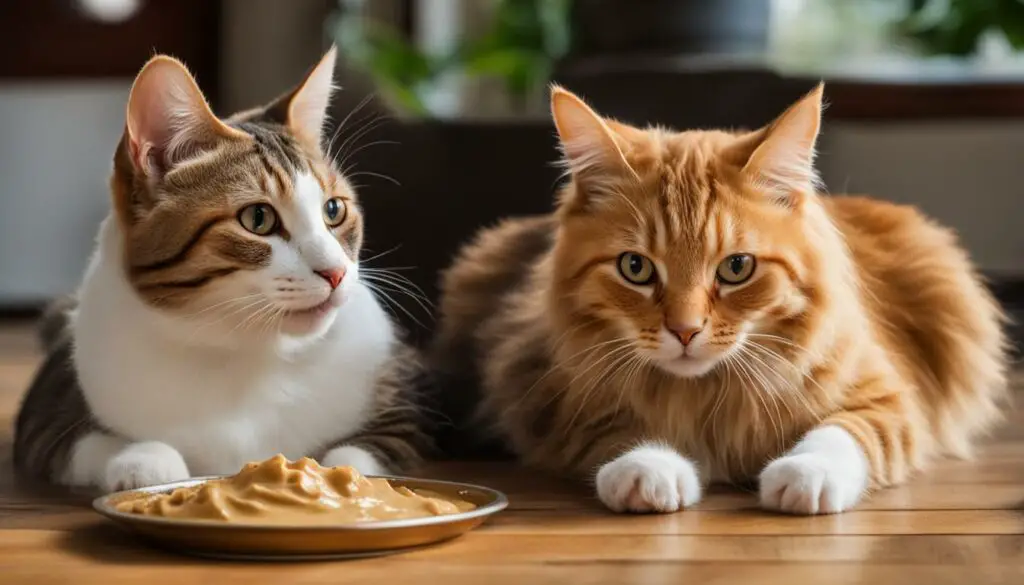
Why is Peanut Butter Bad for Cats?
When it comes to cats, peanut butter is not a suitable addition to their diet. While humans may enjoy peanut butter as a tasty treat, it does not provide any significant nutritional value for cats. Peanut butter mainly consists of empty calories, lacking the essential nutrients that cats need to thrive. As obligate carnivores, cats require a diet primarily based on animal protein, which peanut butter does not offer.
Regular consumption of peanut butter can lead to weight gain in cats, especially those who are already overweight. The high calorie and fat content in peanut butter can contribute to obesity-related health issues in feline companions. Additionally, peanut butter’s thick consistency can pose a choking hazard for cats, particularly those with smaller mouths and throats.
Cats have specific dietary needs, and feeding them peanut butter in moderation or as a regular treat can lead to potential health issues. It is best to prioritize a diet that is specifically formulated for cats, focusing on animal-based protein sources to meet their nutritional requirements. There are numerous alternative treats available that are designed with feline dietary needs in mind, providing a safer and healthier option for treating our beloved cats.
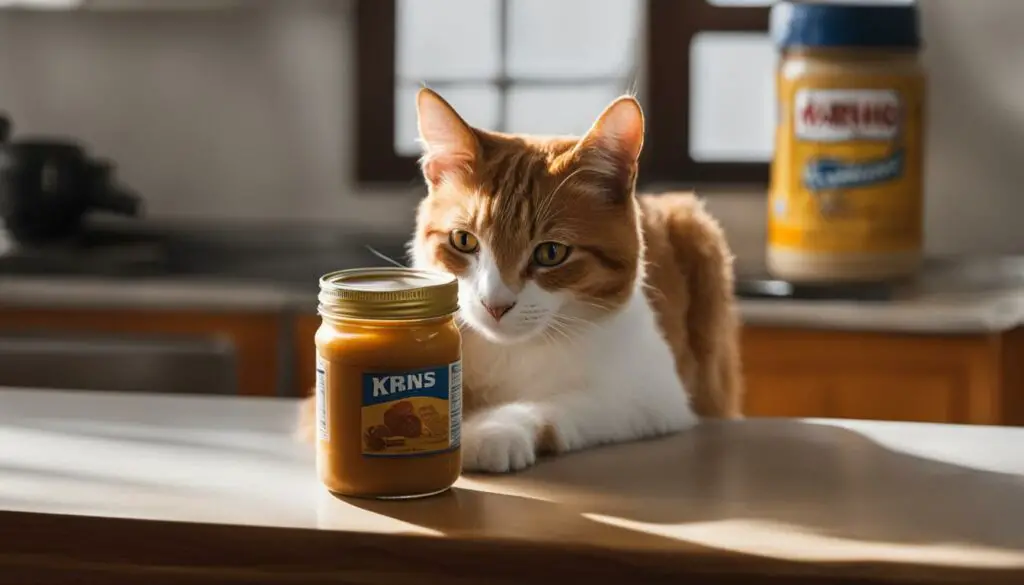
| Nutritional Value | Empty Calories | Carnivorous Diet | Fat Cats | Health Issues |
|---|---|---|---|---|
| Inadequate | High | Incompatible | Potential | Possible |
When Can Cats Eat Peanut Butter?
While cats can have peanut butter occasionally, it is important to consider a few factors before offering it to them. Here are some key points to keep in mind:
Pill Administration: Peanut butter can be a useful tool for administering medication to cats. Its sticky texture helps mask the taste of the medication, making it easier for cats to swallow. However, it is crucial to consult with your veterinarian for dosage instructions and to ensure that the medication is safe to be given with peanut butter.
Nutrition Label: When purchasing peanut butter for your cat, it is essential to read the nutrition label. Look for peanut butter that does not contain xylitol, a sweetener that can be toxic to cats. Also, consider the calorie count and fat content of the peanut butter, as excessive intake can contribute to weight gain in cats.
Portion Size: Cats should only be given peanut butter in small amounts. A teaspoon-sized portion is typically sufficient for a cat. This helps to prevent excessive calorie intake and ensures that the peanut butter does not become a significant part of their diet.
Vet Consultation: Before introducing peanut butter to your cat’s diet, it is always advisable to consult with your veterinarian. They can provide personalized guidance based on your cat’s specific dietary needs and health status.
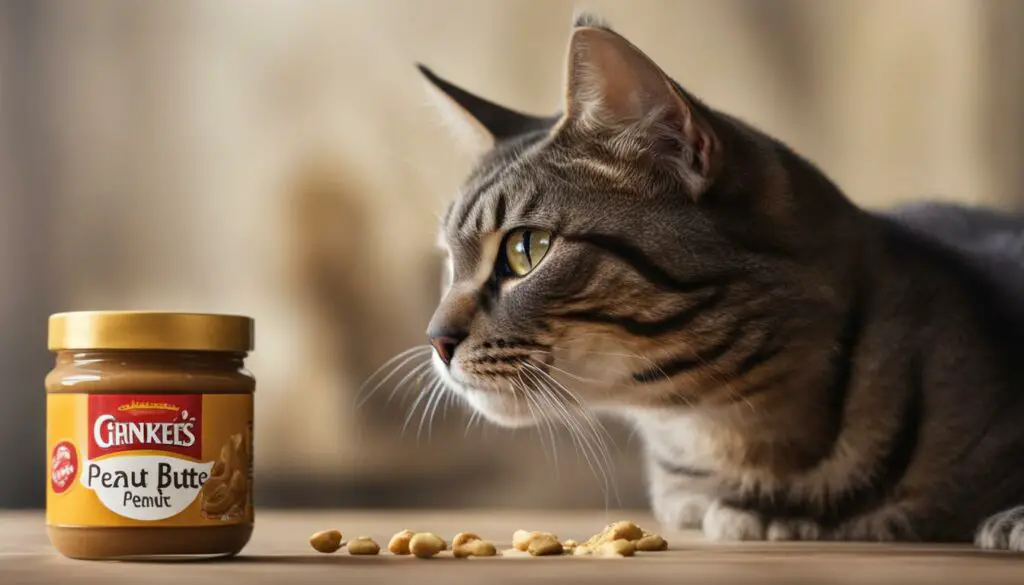
Cats and Peanut Butter: FAQs
As a popular treat for humans, peanut butter may tempt cat owners to offer it to their feline friends. However, it’s essential to understand the potential side effects and considerations when it comes to cats and peanut butter. Here are some common questions and answers to help guide you:
Can cats lick peanut butter?
Yes, cats can lick peanut butter. Licking a small amount of peanut butter is unlikely to cause significant issues for most cats. However, it is important to remember that peanut butter is not a natural part of a cat’s diet and should be given in moderation.
Are there any side effects of feeding cats peanut butter?
While some cats may tolerate small amounts of peanut butter without any adverse effects, others may experience digestive distress such as diarrhea or vomiting. Additionally, peanut butter is high in calories, fat, and carbohydrates, which can contribute to weight gain and obesity-related health issues in cats. It’s best to consult with a veterinarian before introducing peanut butter into your cat’s diet.
Can kittens eat peanuts or peanut butter?
Kittens have delicate digestive systems and specific nutritional needs. Peanuts and peanut butter are not recommended for kittens, as they may struggle to digest these foods properly. It is best to stick to a balanced diet recommended by your veterinarian for your kitten’s health and development.
Remember, while it may be tempting to share your favorite treat with your furry friend, it is essential to consider their specific dietary needs. Consult with a veterinarian for guidance on suitable treats and ensure that any new food introduced into your cat’s diet is given in moderation and does not pose any potential health risks.
Cats and Peanuts: A Summary
In summary, while peanuts are not toxic to cats, they are not recommended for their diet due to several nutritional concerns. Peanuts are high in fat and can be difficult for cats to digest, potentially causing digestive issues. Cats require animal-based protein in their diet, and peanuts do not provide the necessary nutrients in the appropriate form. Furthermore, peanuts can contribute to weight gain in cats. The high sodium content in some peanuts can lead to salt poisoning, especially in cats with existing heart or kidney issues. Peanuts can also pose risks of allergies for cats due to their high protein content.
It is best to avoid giving peanuts to cats and opt for alternative treats that are specifically formulated for feline dietary needs. There are many safe and feline-friendly alternatives available, such as fish treats or meat treats that provide the necessary animal protein. Dental treats can also be beneficial for oral health. It is important to choose treats that meet the nutritional needs of cats and are designed specifically for their digestive systems.
“While peanuts may seem like a tempting treat for cats, they do not provide the necessary nutrients for a healthy feline diet. It is important to prioritize a diet that consists mainly of animal-based protein sources and offer alternative treats in moderation.”
Summary Table: Nutritional Comparison of Peanuts and Feline-Friendly Treats
| Treat | Protein Content | Fat Content | Carbohydrate Content | Nutritional Benefits |
|---|---|---|---|---|
| Fish Treats | High | Low | Low | Provides essential animal-based protein, supports healthy skin and coat, and contains omega-3 fatty acids for overall wellness. |
| Meat Treats | High | Low | Low | Rich in animal protein, promotes muscle growth and maintenance, and satisfies a cat’s natural carnivorous instincts. |
| Dental Treats | Varies | Varies | Varies | Helps reduce tartar and plaque buildup, supports oral health, and provides a crunchy texture for dental stimulation. |
When it comes to treating our feline friends, moderation is key. While a small taste of peanut butter or a few crushed peanuts may not cause harm, it is important to remember that cats have specific dietary needs. Offering alternative treats that are specifically formulated for cats ensures that they receive the necessary nutrients without the potential risks associated with peanuts. It is always advisable to consult with a veterinarian before introducing any new food to your cat’s diet, especially if you have any concerns or questions.
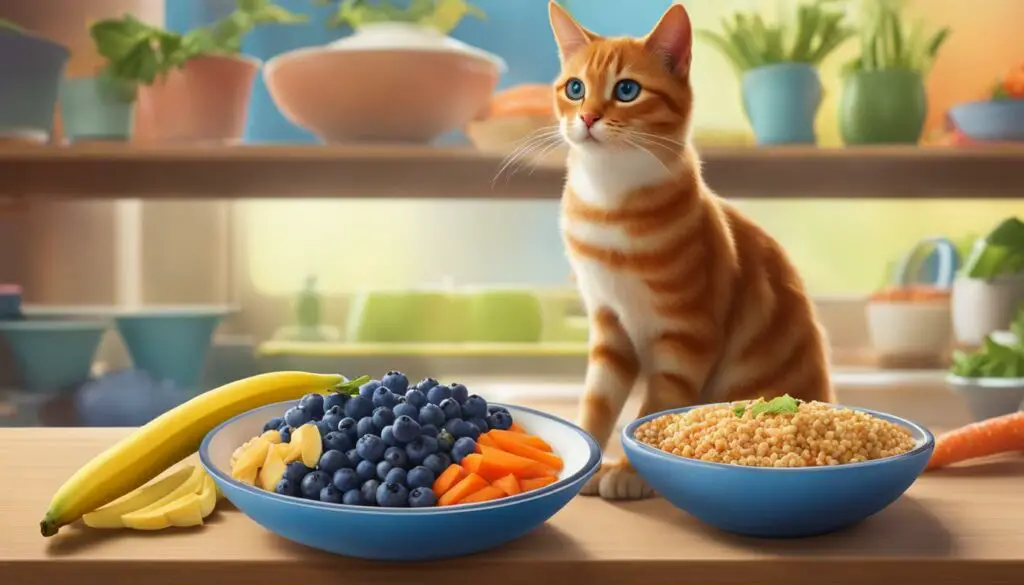
Cats and Peanuts: The Bottom Line
In conclusion, it is not recommended to feed peanuts to cats due to their nutritional profile and potential health risks. Peanuts do not provide the necessary nutrients required in a cat’s diet, as they primarily need animal-based protein. Regular consumption of peanuts can lead to weight gain, digestive issues, and allergies in cats. To ensure optimal feline health, it is best to prioritize a diet specifically formulated for cats.
Instead of peanuts, there are alternative treats available that meet the dietary needs of cats. These treats are specifically designed to provide the necessary nutrients, including animal protein, that cats require for proper growth and development. Opting for these feline-friendly alternatives ensures that cats receive the appropriate nutrition without any potential risks associated with peanuts.
When selecting treats for cats, it is essential to choose options that are specifically formulated for feline dietary needs. Fish treats, meat treats, and dental treats are excellent alternatives to peanuts as they provide the necessary nutrition in a safe and enjoyable form for cats. These treats cater to their taste preferences and support their overall health, without the potential risks of peanuts.
Ultimately, while cats can technically eat peanuts, it is best to avoid offering them due to the potential health concerns. By prioritizing a diet that meets their unique dietary needs and providing alternative treats, cat owners can ensure the well-being and happiness of their feline companions.
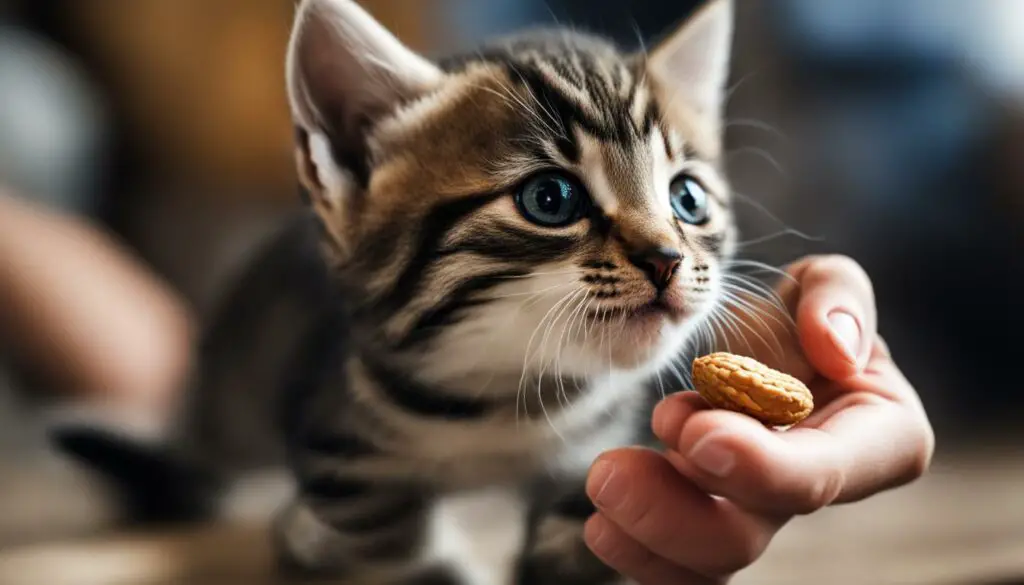
Safe and Feline-Friendly Alternatives to Peanuts
When it comes to treating our beloved feline friends, it’s important to choose options that are not only safe but also meet their nutritional needs. While peanuts may not be the best choice for cats, there are plenty of alternative treats that they will enjoy. Here are some healthy cat treat options:
Fish Treats:
Many cats are fond of fish flavors, and fish treats can be a great alternative to peanuts. These treats are specifically formulated for cats and provide the necessary animal protein that cats require in their diet. Fish treats can also be packed with omega-3 fatty acids, which promote a healthy coat and support overall well-being.
Meat Treats:
Meat treats are another excellent option to consider. Cats are obligate carnivores, and meat treats provide them with the essential animal-based protein they need to thrive. Whether it’s chicken, beef, or turkey, cats will enjoy these flavorful treats while receiving the necessary nutrients for a balanced diet.
Dental Treats:
Dental health is crucial for cats, and dental treats can help maintain their oral hygiene. These treats are designed to remove plaque and tartar buildup, promoting healthy teeth and gums. Look for dental treats that are specifically formulated for cats to ensure they are both safe and effective.
By opting for these safe and feline-friendly alternatives, you can provide your cat with tasty treats that meet their dietary needs. Always remember to offer treats in moderation, as they should not replace a balanced diet. Consult with your veterinarian to determine the most suitable treat options for your cat and ensure their overall health and well-being.
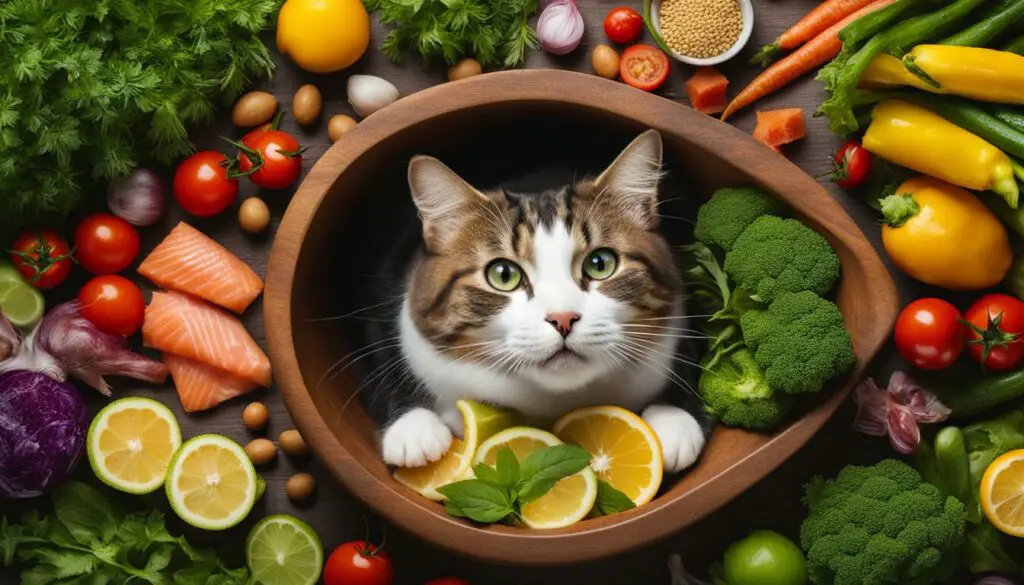
Conclusion
After delving into the topic of whether cats can eat peanuts, it is clear that while peanuts are not toxic to cats, they are not recommended for their diet. Cats have specific nutritional needs that are best met through a feline diet consisting primarily of animal-based protein. Peanuts, being high in fat and difficult to digest, can cause digestive issues in cats.
Furthermore, peanuts can pose risks of allergies and choking hazards for cats. While some cats may enjoy the taste of peanuts, most cats prefer flavors like fish or meat. It is important to note that peanuts should be offered to cats in minimal amounts, and crushed or halved form is preferred.
If you are looking for alternative treats for your cat, there are plenty of safe and feline-friendly options available in the market. Fish treats, meat treats, and dental treats that are specifically formulated for cats can be excellent choices. These treats provide the necessary nutrients and are designed to meet feline dietary needs.
In conclusion, it is best to prioritize your cat’s health by offering a diet that focuses on animal-based protein sources and providing alternative treats that are specifically formulated for cats. While peanut butter can be used occasionally, it should be used with caution and in consultation with a veterinarian. Always remember that your cat’s well-being is of utmost importance when it comes to their diet and treats.
FAQ
Can cats eat peanuts?
While peanuts are not toxic to cats, they are not recommended for their diet due to their high fat content and potential digestive issues.
Are peanuts good for cats?
Peanuts do not provide the necessary nutrients for a healthy feline diet. Cats require animal-based protein, and peanuts are not a suitable source.
Do cats like the taste of peanuts?
Cats have individual taste preferences, but most cats prefer fishy or meaty flavors over the taste of peanuts.
How many peanuts can a cat eat?
Peanuts should be offered to cats in minimal amounts. It is important to monitor for any allergic reactions or digestive issues.
How often can a cat eat peanuts?
Peanuts should not be a regular part of a cat’s diet. Extra treats and tidbits like peanuts should be given in moderation.
Are peanuts used in commercial cat food?
Peanuts are not commonly used in cat food, as cats generally prefer fish or meat flavors over peanut flavors.
Are peanuts bad for cats?
Peanuts can contribute to weight gain, digestive issues, and allergies in cats. The sodium content in some peanuts can also lead to salt poisoning.
Can cats eat peanut butter?
Peanut butter is not recommended as a regular part of a cat’s diet due to its high fat and calorie content. It can also pose a choking hazard for cats.
Why is peanut butter bad for cats?
Peanut butter does not provide significant nutritional value for cats and can contribute to weight gain and digestive issues.
When can cats eat peanut butter?
Peanut butter can be given to cats occasionally, but it should be in small amounts and without any harmful ingredients like xylitol. Consult with a veterinarian before introducing peanut butter to a cat’s diet.
Cats and peanut butter: FAQs
Common questions include the potential side effects of peanut butter, the amount cats can have, and whether kittens can eat peanuts.
Cats and peanuts: A summary
Peanuts are not recommended for cats due to their nutritional profile and potential health risks. It is best to prioritize a diet specifically designed for cats and offer alternative treats.
Cats and peanuts: The bottom line
Peanuts are not recommended for cats. It is best to focus on a diet that meets their nutritional needs and choose alternative treats that are specifically formulated for cats.
Safe and feline-friendly alternatives to peanuts
Fish treats, meat treats, and dental treats that are specifically formulated for cats are excellent alternatives to peanuts.
Conclusion
Peanuts are not recommended for cats due to their nutritional profile and potential health risks. It is best to prioritize a diet specifically designed for cats and offer alternative treats.

